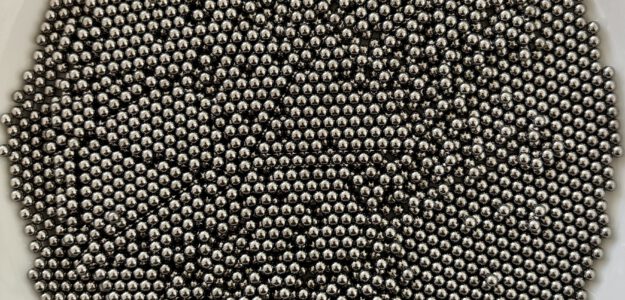Main specifications of Tungsten Carbide Grinding Balls Type BTC
| Item | Value |
|---|---|
| ISO / USA / CHN | K20 / C1 / YG6 |
| WC (Wolfram Carbide = Tungsten Carbide) | 93% – 95,0 % |
| Co | 5,0 – 7,0 % |
| Density | 14,95 g/cm3 |
| Young’s Modulus | 650 GPa |
| Specific Heat | 225 J/kg-K |
| Coefficient of lineair thermal expansion | 5,2 10^-6/C |
| Thermal conductivity | 83,0 W/(m-K) |
| Relative magnetic permeability | max. 12 mu |
| Grain Size | 1,2 – 1,6 mum |
| Hardness | 1550 -1780 HV |
| Ultimate compressive strenght | 4600 – 5800 MPa |
Size
Standard sizes range from Φ 0.2 mm to Φ 30 mm. On special demand even to Φ 127 mm.
Applications
BTC Tungsten Carbon WC balls conform to the ISO K20 and USA C1 standards. They are used in applications where extreme hardness and resistance to wear, abrasion, collision and deformation are required. Virgin powder is strictly used into the production.
Some examples of applications are: Special and hydraulic precision valves, special bearings, couplers, flow meters, sprayers, recirculating balls, ball splines, tool machines, sliding rails, ballpoint pens, pin and tips for indicators, precision measurement instruments, medical instruments. They are used in naval, mining, petrol and coining industry.
As a general rule Tungsten Carbides with Cobalt binder show good corrosion resistance into basic solution while they are not resisting into acid solutions.
We can provide you also with other ISO variants of Tunsten Carbide balls with other chemical composition, resulting in other chemical, physical, mechanical, thermal, electric and magnetic properties. ISO variants are K30 (≈YG8≈C2) and K05-K10. There are also non ISO variants in which the Co binder is replaced by Ni. These last variants have good corrosion resistance in basic and neutral solutions and for acid solutions they resist up to pH 3. Please ask advice. Maybe one of our other variants better suit your application.


